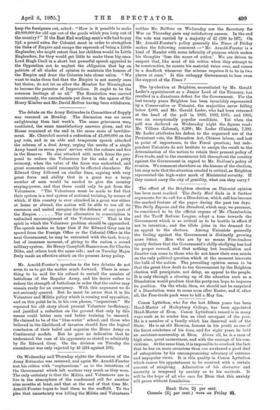The debate on the Army Estimates in Committee of Supply
was resumed on Monday. The discussion was no more enlightening than last week's. The same grievances were ventilated, the same unsatisfactory answers given, and the House remained at the end in the same state of bewilder- ment. Mr. Churchill moved a reduction of 2100,000 on the pay vote, and in an able and temperate speech attacked the scheme of a dual Army, urging the merits of a single Army based on seven years' service with the colours and five in the Reserve. He also attacked with much force the pro- posal to reduce the Volunteers for the sake of a petty economy, when the value of the force was undoubted, and great economies could reasonably be effected elsewhere. Sir Edward Grey followed on similar lines, arguing with very great force and ability that in a great war a large number of men would be needed to give the country staying-power, and that these could only be got from the Volunteers. "The Volunteers must be made to feel that their system is a real system of national training, by means of which, if this country is ever attacked in a great war either at home or abroad, the nation will be able to use all its resources and united energies for the defence of any part of
the Empire The real alternative to conscription is unlimited encouragement of the Volunteers." That is the spirit in which the Volunteer problem should be approached. The speech makes us hope that if Sir Edward Grey can be spared from the Foreign Office or the Colonial Office in the next Government, he may be entrusted with the task, heavy, but of immense moment, of giving to the nation a sound military system. Sir Henry Campbell-Bannerman, Sir Charles Dilke, and others took the same side ; and on Tuesday Major Seely made an effective attack on the present Army policy.










































 Previous page
Previous page